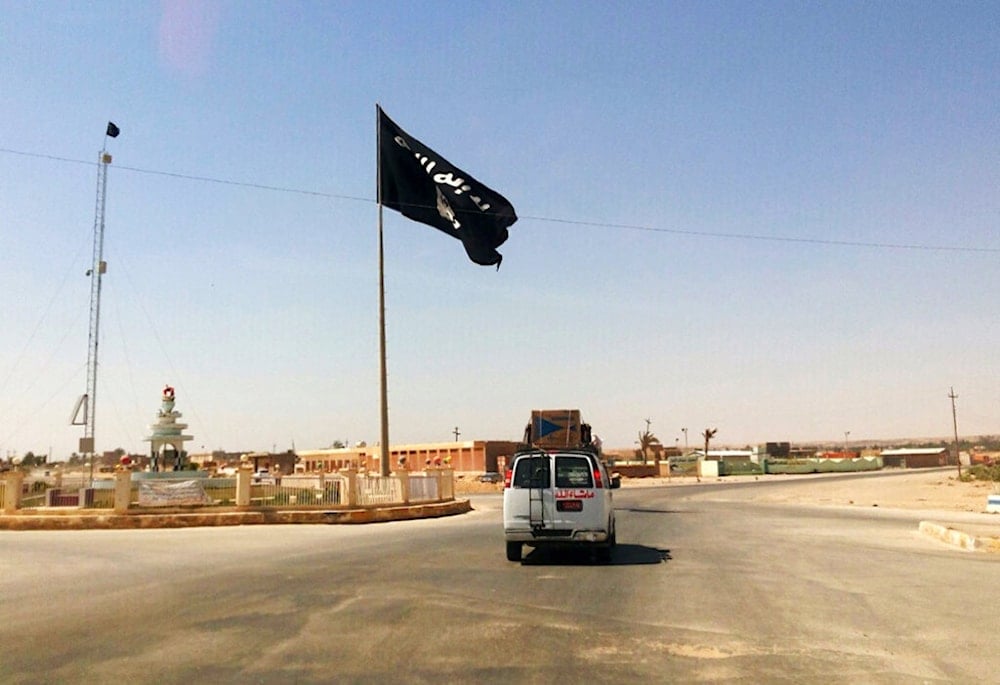ISIS resurgence in Syria threatens stability amid political shifts
ISIS is capitalizing on Syria’s instability, with an expected significant increase in attacks and a looming threat of future prison breaks. The group’s presence is growing as it exploits the ongoing chaos, according to a report.
-

This Tuesday, July 22, 2014 photo shows a motorist passing by a flag of the Islamic State group in central Rawah, 281 kilometers northwest of Baghdad, Iraq. (AP)
British newspaper The Times raised serious concerns about the resurgence of ISIS as Syrians celebrate what they describe as "after decades of brutal rule by the Assad regime." The paper emphasized that ISIS could capitalize on the instability in Syria to reorganize, regroup, and launch new attacks.
US National Security Advisor Jake Sullivan warned that the greatest threat in the region is the return of ISIS, stating that the group aims to exploit any power vacuum or lack of stability in the country.
Over the past year, ISIS has resurfaced in Syria, with The Times noting that global conflicts, such as the war in Ukraine and unrest in the Middle East, have diverted media and intelligence attention away from the growing threat. This has allowed ISIS to gradually rebuild its presence, leading to a rise in attacks. The paper highlighted that ISIS executed nearly 700 operations in Syria this year, tripling the number from the previous year.
The group is believed to still have around 2,500 fighters operating between Syria and Iraq, and this number is expected to grow due to increased recruitment and propaganda efforts. ISIS is particularly active in the central Badiya Desert, the report stressed, adding that they are organizing sleeper cells and executing ambushes, including assassinations of Syrian tribal leaders who oppose them.
The Times also pointed out that the situation in northeastern Syria is particularly alarming, with approximately 9,000 ISIS fighters and more than 40,000 family members of ISIS detainees held in camps and prisons guarded by the US-backed Syrian Democratic Forces (SDF). The ongoing clashes between the SDF and Turkish-backed Syrian National Army (SNA) forces risk drawing the SDF away from its duties guarding these facilities, creating a potential opening for ISIS to exploit.
"ISIS is watching closely, monitoring recent events in order to identify any moment of weakness," The Times explained.
Historically, ISIS has not hidden its agenda of freeing its fighters from captivity. The group previously launched a campaign in 2012-2013, orchestrating multiple prison breaks that freed hundreds of senior and mid-level terrorists. If ISIS were to execute a similar operation at prominent facilities like al-Hol or Roj camps, the media impact alone would be immense, with even the release of a small number of fighters giving the group a significant boost.
The Times concluded that it was only a matter of time before ISIS attempts a full-scale assault on prisons and detention centers in Syria. The group’s reach and complexity have grown this year, and with the increase in its attack frequency, the threat remains ever-present.
SDF's Abdi rejects federalism, seeks integration into Syrian army
The commander of the Syrian Democratic Forces (SDF), Mazloum Abdi, denied demands for a federal system in Syria, according to France 24. He stated that his forces seek to be part of a centralized Syrian state without division.
Abdi expressed a desire for the SDF to join a future Syrian national army, if formed, and is ready to discuss this with the new government in Damascus. He noted that the SDF has not yet negotiated with the new leadership in Damascus about Syria's future but is open to doing so.
Abdi welcomed the recent statements from the new Damascus administration, calling them "positive so far," and urged the government to fulfill its duty to implement a ceasefire across Syria.
He also clarified that the SDF is not an extension of the Kurdistan Workers' Party (PKK) and is prepared to remove non-Syrian fighters once a ceasefire is reached.
Furthermore, Abdi mentioned that the SDF is in contact with the US to pressure Turkey for a ceasefire, highlighting that Turkish-backed factions are advancing near Ain al-Arab in the northern countryside of Aleppo, approaching Manbij and the Euphrates River.
Read more: 'Israel', Turkey expand influence in post-Assad Syria: Bloomberg

 4 Min Read
4 Min Read








